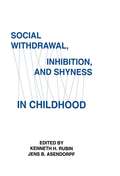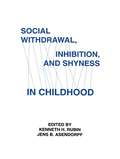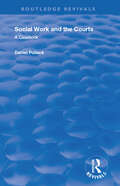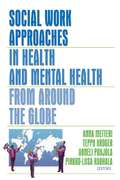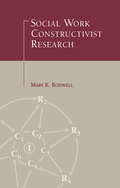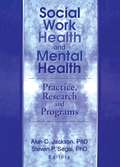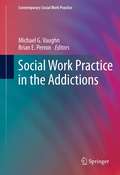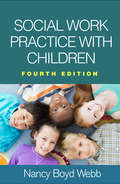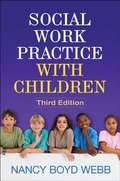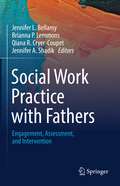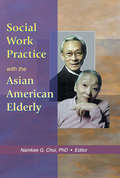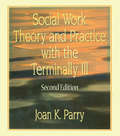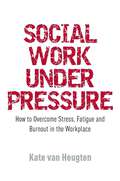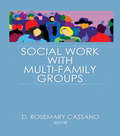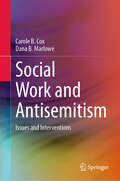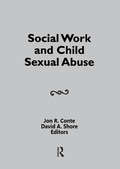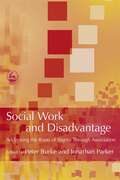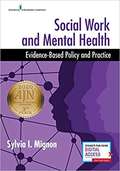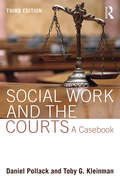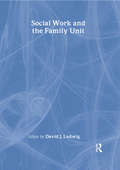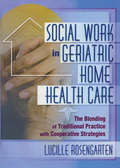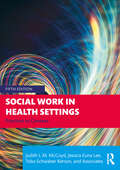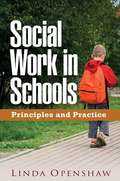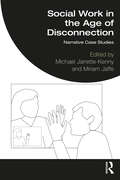- Table View
- List View
Social Withdrawal, inhibition, and Shyness in Childhood
by Jens B. Asendorpf Kenneth H. RubinPsychologists of varying theoretical persuasions have long held that social experiences are critical to normal developmental trajectories and that the lack of such experiences is worthy of compensatory attention. Surprisingly, however, little empirical attention has been directed to the study of the psychological significance of social solitude for children. In an effort to shed new light on the meanings and developmental course of social solitude in childhood, a group of esteemed scholars from Europe and North America was invited to share and exchange information. An international audience of researchers actively involved in the study of social withdrawal and social inhibition or shyness in childhood was led in discussion by the scholars whose chapters are published in this volume. The editors hope that this offering stimulates continuing efforts to better understand the developmental meanings, causes, and courses of this childhood social dysfunction.
Social Withdrawal, inhibition, and Shyness in Childhood
by Jens B. Asendorpf Kenneth H. RubinPsychologists of varying theoretical persuasions have long held that social experiences are critical to normal developmental trajectories and that the lack of such experiences is worthy of compensatory attention. Surprisingly, however, little empirical attention has been directed to the study of the psychological significance of social solitude for children. In an effort to shed new light on the meanings and developmental course of social solitude in childhood, a group of esteemed scholars from Europe and North America was invited to share and exchange information. An international audience of researchers actively involved in the study of social withdrawal and social inhibition or shyness in childhood was led in discussion by the scholars whose chapters are published in this volume. The editors hope that this offering stimulates continuing efforts to better understand the developmental meanings, causes, and courses of this childhood social dysfunction.
Social Work & the Courts: A Casebook
by Daniel Pollack Toby G. KleinmamSocial Work and the Courts is a compendium of the most recent and important legal cases in social work and social welfare. Its dissection and analysis of crucial cases makes it an excellent tool for teaching social workers to understand the legal system and its operation. The book demonstrates how courts view and deal with the performance, action, and conduct of social workers and their agencies. This second edition includes more case studies, paying particular attention to recent cases on foster care and child welfare. In addition, a new section on "References and Further Readings" has been added to the end of each chapter along with an update bibliography and Internet bibliography so that readers may easily find supplementary information.
Social Work ASWB® Clinical Exam Guide: A Comprehensive Study Guide for Success (Second Edition)
by Association of Social Work BoardsStudents and social workers preparing for the social work clinical licensure exam will find an invaluable study resource in the Social Work ASWB® Clinical Exam Guide. Written by a prominent social work leader and trainer for social work licensing exams in the United States, this guide is based on years of time-tested exam prep workshops conducted by the author. It mirrors the ASWB Clinical “Knowledge, Skills, and Abilities” upon which the exam is based and incorporates information from the DSM®-5. The guide is comprehensive yet focuses on the material most likely to be included on the exam, so readers can prioritize information as they study. A self-assessment section helps identify strengths and weaknesses before tackling the material. The author shares her extensive knowledge of the exam by providing useful test-taking strategies and tips for overcoming test anxiety. The 170-question practice test at the end of the guide (with explanations of the correct answers) mirrors the actual exam in both length and structure. Content includes human development, human behavior in the environment, diversity, addictions, assessment and diagnosis, treatment planning, clinical interventions, case management, and professional values and ethics. This book will be a valuable asset for social workers throughout the United States and Canada.
Social Work Approaches in Health and Mental Health from Around the Globe
by Pirkko-Liisa Rauhala Anna Metteri Teppo Kroger Anneli PohjolaOvercome the challenges facing social workers today with international guidance Social Work Approaches in Health and Mental Health from Around the Globe is a valuable stepping stone toward an understanding of the diversity of methods utilized in social work for community health services. This work stems from material gathered at the Third International Conference on Social Work in Health and Mental Health, held in Tampere, Finland. In this book, you will find new creative theoretical and practical orientations for designing, developing, and analyzing social work to help you produce policies and services in which clients can positively and productively invest.Social Work Approaches in Health and Mental Health from Around the Globe covers a long period in the history of social work in health issues, from theoretical treatises to empirical research and analyses of practices. The book provides you with research, case studies, and existing international and national literature from India, Botswana, Taiwan, Lithuania, the United Kingdom, Australia, and the United States. This resource explores the shared qualities of social work in health services throughout the world despite differences between countries in terms of culture, social system, and history. Although these experts come from different parts of the world, the book displays an emergence of similar issues and themes, including: the development of expertise for social workers in the health and mental health fields social work as an agent of change that crosses borders, operates on many levels, and across many dimensions of society community-based care-principles, perspectives, marginalized groups, and the role of the social worker dual divisions-becoming aware of and choosing a position in work practice
Social Work Constructivist Research (Social Psychology Reference Series)
by Mary Katherine O'ConnorFirst published in 1998. Routledge is an imprint of Taylor & Francis, an informa company.
Social Work Health and Mental Health: Practice, Research and Programs
by Steven P. SegalRise to today’s challenges with these innovative and helpful value-based solutions!Containing important, research-based insights into social work practice in these fields, Social Work Health and Mental Health Practice, Research and Programs provides unique perspectives on shared practice problems from around the world, offering new solutions to the dilemmas practitioners face every day, such as reduced reliance in inpatient/residential service provision, increased reliance on economics in the era of managed care, the move toward multidisciplinary service provision, the growing awareness of diversity of needs, and the cultural requirements of providing effective services.Social Work Health and Mental Health Practice, Research and Programs provides unique international perspectives on real-world social work practice issues, including: ways to use your social work skills to solicit organ/tissue donation for transplants how a social work directed community organization affected change in health behaviors in East Harlem, New York a look at how to promote psychosocial well-being following a diagnosis of cancer a survey of what mental health services Hong Kong elderly feel they need and what they now receive an examination of the role of demographics and social support in clinician- and patient-related compliance among HIV/AIDS patients a discussion of the appropriateness of hospice services for non-English speaking patients and much more!
Social Work Practice in the Addictions
by Brian E. Perron Michael G. VaughnSocial workers represent the largest body of addiction and mental health service providers, and there is a consistent need for up-to-date information. Social Work Practice in the Addictions is a comprehensive evidence-based volume. Contributing authors of this volume have been carefully selected to ensure representation of the leading social work addiction researchers. Additionally, researchers from other allied fields, including psychiatry, psychology, and public health, will also be involved to ensure a strong interdisciplinary perspective. Unlike other texts on addiction, this book incorporates ideas of social justice, practice with diverse communities, and ethics to represent the entire knowledge base of social work.
Social Work Practice with Children, Fourth Edition: A Handbook For Practitioners (Clinical Practice with Children, Adolescents, and Families)
by Nancy Boyd Webb Luis H. ZayasA leading course text and practitioner resource for over 20 years--now revised and updated--this book presents developmentally and culturally informed methods for helping children in family, school, and community settings. Nancy Boyd Webb offers vital guidance and tools for practitioners. The text demonstrates research-based strategies for working with victims of maltreatment and trauma as well as children affected by poverty, parental substance abuse, bullying, and other adversities. Vivid case examples illustrate the "whys" and "how-tos" of play and family therapy, group work, and school-based interventions. Student-friendly features include thought-provoking discussion questions and role-play exercises. Reproducible assessment forms can be downloaded and printed in a convenient 8 1/2" x 11" size. New to This Edition *Chapter on working with immigrant and refugee children. *Coverage of additional evidence-based practices for intervening with kids. *Discussion of therapist self-care. *Coverage of working with gender-nonconforming children. *Updated for DSM-5, and features up-to-date research on brain development, trauma, and more.
Social Work Practice with Children, Third Edition
by James W. Drisko Nancy Boyd WebbWidely adopted, this bestselling work provides the knowledge that social workers need for effective, culturally competent practice with children, adolescents, and their caregivers. The author presents a framework for developmentally informed assessment and intervention and describes a variety of powerful helping methods, illustrated with vivid case examples. Demonstrated are research-based strategies for working with victims of abuse and trauma as well as children affected by poverty, divorce, parental substance abuse, and other adverse circumstances. Special features include instructive discussion questions and role-play exercises. Reproducible assessment forms can also be downloaded and printed in a convenient 8 1/2" x 11" size. New to This Edition Updated to incorporate current research on child development, attachment, and trauma. Chapter on bullying. New discussions of autism, childhood obesity, and blended families. School social work chapter has been extensively revised. Expanded examples of group work, including groups for children with ADHD and crisis groups following disasters.
Social Work Practice with Fathers: Engagement, Assessment, and Intervention
by Jennifer L. Bellamy Brianna P. Lemmons Qiana R. Cryer-Coupet Jennifer A. ShadikSocial workers need to work with fathers across many service systems, but lack guidance on how to do so, and most engagement, assessment, and intervention work for family-serving systems is mother- and child-focused. Father-inclusive readings and resources are also limited. Drawing on the expertise of well-regarded research and practice experts in the field, this comprehensive book provides guidance to social work practitioners and researchers on how to engage, assess, and serve fathers. Instructors can use the text to include fathers in courses on the human behavior and social environment, family systems, clinical practice, diversity, or service systems.Social service systems, unfortunately, have often struggled to positively engage men as parents. Recent demographic trends indicate that fathers are providing more direct care to children and single-father households are one of the most rapidly growing demographic groups in the United States. Barriers to their successful engagement include biases and assumptions about men and fathers, a lack of father-friendly policies and practices in the field, limited training on how to work with fathers, and relatively limited father-inclusive social work research until recently. This book addresses these barriers. It is a guide to social workers in their efforts to better serve men as parents, and does so from an ecological and systems perspective. Multiple case examples and practical tools are provided, as well as specific content on major social service systems. Topics explored include:Father EngagementOrganizational “Father Friendly” AssessmentsInterventions with FathersSetting the Course for Future Theory, Research, and Practice with Fathers Social Work Practice with Fathers: Engagement, Assessment, and Intervention is a book that could be folded into foundation courses in social work or used by practitioners in the field. It is an essential text for graduate students in social work, psychology, sociology, child development, allied health, and similar disciplines and professions, and a go-to resource for helping professionals/practitioners such as social workers, psychologists, and licensed professional counselors. Advanced undergraduate students in these disciplines and professions also will find the text useful in their studies and work.
Social Work Practice with the Asian American Elderly
by Namkee G ChoiThis fascinating book addresses the cultures and concerns of five major ethnic groups: Chinese, Japanese, Korean, Asian Indian, and Vietnamese. Social Work Practice with the Asian-American Elderly examines the diverse needs of this rapidly growing population. It suggests interventions and service-delivery models that are culturally sensitive and appropriate for these clients, many of whom are first-generation immigrants still closely linked with their cultures of origin. This comprehensive book serves as a timely resource for both researchers and practitioners concerned with this neglected yet rapidly growing segment of the elderly population. Social Work Practice with the Asian-American Elderly offers both quantitative and qualitative research on essential topics, including: migratory grief assimilation depression elderly nutrition programs social support
Social Work Theory and Practice with the Terminally Ill
by Joan K ParrySocial Work Theory and Practice with the Terminally Ill, second edition, takes a compassionate look at ways that social workers can help dying people and their families. The social workers who work most effectively with terminally ill patients and their families are the ones who best understand the multifaceted nature of the dying process and its impact on the the patient, the family, and even on the health care professionals who work with patients at the end of life. Dr. Parry--who specializes in dying and bereavement--offers astute observations on the stages of dealing with the diagnosis of a terminal illness and the impending death that patients and their families confront. This updated second edition provides valuable new information on ways that social workers can help those with AIDS and their families, on traumatic death from any cause, and on the grieving processes of parents.Social Work Theory and Practice with the Terminally Ill, second edition, also includes stimulating discussions on: the interdisciplinary health team the grieving process professional burnout how social workers adapt to working with dying patients euthanasia and physician-assisted dying living wills and patients’rightsIn touching case studies, this volume illustrates the particular needs and concerns of the terminally ill and their families--impending losses, financial worries, job concerns, pain, unfinished business, and spiritual needs--and reviews successful interventions used by social workers to help patients and their families work through the dying process.
Social Work Under Pressure
by Kate Van HeugtenStress, fatigue and burnout are serious problems in the social work profession. High case loads, staff shortages, budget cuts and the challenging nature of the job contribute to high levels of stress, and social workers can crack under the pressure. This accessible book demonstrates how managers and practitioners can overcome workplace distress, fatigue and burnout by understanding the causes and implementing practical strategies. Part 1 outlines how stress, fatigue, burnout and trauma can be identified, how they impact upon social workers, and what strategies can help. Part 2 explores stress in particular settings, covering frontline practice, working with trauma, working with aggressive service users, bullying and violence in the workplace, and making mistakes. The book is rooted in the reality of everyday social work, incorporating the views and experiences of practising social workers. This book is full of techniques and tips that will be invaluable to all social work managers and practitioners seeking to beat workplace stress overload and burnout.
Social Work With Multi-Family Groups
by D Rosemary CassanoHere is a remarkable new volume for understanding the interrelatedness of the primary family group and the formed therapeutic group. Multiple family therapy is a special type of group practice that involves the members of several families meeting together with a professional to work on common family concerns. Rosemary Cassano, acclaimed for her qualitative research on multiple family group therapy, has produced an exciting volume that reflects the diversity of client populations and patterns and processes in these groups. Social Work With Multi-Family Groups reveals to the professional what actually goes on in the process of group interactions and practitioner interventions. In this state-of-the-art volume, social workers set forth a specific and careful definition of multiple family practice and examine the successful use of multi-family groups with families with child-labeled problems, institutionalized elderly suffering from physical and cognitive impairments and their family members, patients with life-threatening illness and their families, and several other support groups. Each of the practical examples illustrates how professionals can design helping systems for their clients that combine both professional and peer help and activate the help that is embedded in each client’s own family.
Social Work and Antisemitism: Issues and Interventions
by Carole B. Cox Dana B. MarloweThis timely book on social work and antisemitism fills an important gap in social work education and in the profession. The ethics and framework of the social work profession demand that it confronts oppression and prejudice while working for a socially just society. However, education on antisemitism is seldom included in social work curriculum or in diversity, equity, and inclusion (DEI) programs. This text addresses this need for education and intervention, and includes a teaching guide for use in social work curriculum as well as social work practice. Antisemitism, hatred and discrimination against Jewish people and Jewish institutions, is perhaps the oldest form of oppression. Throughout history, as with other oppressions, myths and stereotypes to substantiate antisemitism were developed. More recently, however, antisemitism has been increasing steadily across the globe. Combatting and dismantling it is critical for both Jewish people and institutions, the social work profession, and for society. In the book, the authors discuss antisemitism's history, the role of the Holocaust, contemporary manifestations of antisemitism, and its impact on individuals and societies. Among the topics covered are: Introduction: Human Rights, Social Justice, and Social Work Palestine, Israel, and Zionism Contemporary Antisemitism Antisemitism and Mental Health Antisemitism: A Guide for Teaching and Social Work Practice Social Work and Antisemitism: Issues and Interventions offers a foundation for combatting antisemitism and addresses the need for social work involvement. The book can be used as a primary or secondary text for courses that cover diversity, human rights, human development, ethnicity, oppression, and mental health in Bachelor- or Masters-level programs in schools of social work. In addition, the book can be used in other programs, such as DEI, or by other disciplines interested in learning about and educating about antisemitism.
Social Work and Child Sexual Abuse
by David A Shore Jon ConteHere is an indispensable book highlighting information on the problem of child sexual abuse for anyone concerned with the welfare of young children. Focusing on the social worker’s role in responding to the abuse of children, this highly practical volume assesses the state of knowledge about sexual abuse. It includes reviews of the historical context in which sexual abuse takes place and sheds light on issues surrounding the professional’s responses to sexual abuse, alternative models of sexual abuse treatment programs, and practice knowledge developments. The contributors have also addressed a number of clinical issues including family treatment and social work treatment at a juvenile court, as well as the role of the courts and the problem of sexual abuse and sexual education in child-caring institutions.
Social Work and Disadvantage: Addressing the Roots of Stigma Through Association
by Peter Burke Jonathan ParkerThis book is a guide to understanding the important issue of stigma - `associated disadvantage' - which affects not only those who are excluded from society, but also family members and friends. Social Work and Disadvantage explains the impact of stigmatization on siblings, families and workers in the caring professions and its consequences for the people it affects and for society as a whole. Contributors provide evidence from research and professional practice on transferability of health and social problems in, for example, dementia care patients, drug users and looked after children. Providing key messages for practice, they outline a range of protection measures to reduce the risk of stigma and victimization. Social Work and Disadvantage provides valuable advice and guidance for social work and health care practitioners, educators and students.
Social Work and Mental Health: Evidence-Based Policy and Practice
by Sylvia I. MignonClear, comprehensive, and accessible, this textbook presents an overview of the contemporary American mental health system and its impact on clients and social workers. The failure of the system to provide quality care for the mentally ill is explored, including issues and policies that social workers face in accessing mental health care for their clients, while also discussing the ways in which social workers can improve the overall functioning of the system and promote the development and expansion of policy and practice innovations. <p><p> This is the first textbook to examine the lack of understanding of the roots of mental illness, the challenges in classification of mental disorders for social workers, and difficult behavioral manifestations of mental illness. By looking at the flaws and disparities in the provision of mental health services, especially in relation to the criminal justice system and homelessness and mental illness, social work students will be able to apply policy and practice to improve mental health care in their everyday work. A focus on the lived experiences of the mentally ill and their families, along with the experiences of social workers, adds a unique, real-world perspective.
Social Work and the Courts: A Casebook
by Daniel Pollack Toby G. KleinmanSocial Work and the Courts is a collection of important and cutting-edge court decisions in the field of human services, now in its third edition. Pollack and Kleinman present an array of legal cases in everyday language, with clear explanation of the facts and issues, and in-depth examinations of the reasoning and implications of each decision. This new edition includes over twenty new cases, all of which happened between 2010 and 2014, making this one of the most significant and timely investigations of how social work and the law intersect. Special attention is paid to recent rulings in child welfare and social worker liability. The dissection and analysis of these influential cases makes this volume an excellent teaching tool and an essential resource for both social workers and policy makers.
Social Work and the Family Unit
by David J. LudwigUse the techniques in this book to conduct productive, successful sessions with your clients!Social Work and the Family Unit offers methods and suggestions for focusing on problems within relationships, rather than simply placing blame, in order to dispel stressful and unhealthy situations. This essential book will show you how to empower couples to understand the relationships that form the fabric of their lives, the benefits ”we” thinking, and how spirituality influences people's connections and experiences. Social Work and the Family Unit provides therapists and clients with techniques and examples for conducting more successful and productive sessions.The authors of the six sections of Social Work and the Family Unit draw on their expertise to address the overwhelming importance of focusing on relationships when working with individuals and families. Editor David Ludwig's ”It's the Relationship, Stupid!” gives specific case descriptions showing that, in most situations, the client is focusing on the wrong thing as the cause of his or her distress. Alex Opper's ”What Do You Mean, 'It's the Relationship'? What's That Got to Do with Step-Parenting” points to the difficulty of, and suggests ways of, forming a good ”we” from the ”us” versus ”them” tensions often found in blended families. Walter Murphy's ”Growing up in a 'We’Family” and William B. Knippa's ”The Family Unit: Place, Base, or Both?” focus on the benefit to children of a united parental front that they cannot manipulate.Donald R. Bardill's ”The Relational Systems Model: Reality and Self-Differentiation” identifies the relationships that form the realities (self, other, context, and spiritual) of each person's life and shows how clients can be empowered to live in each of these four realities as self-differentiated persons.The final chapter, by Joanides, Joanning, and Keoughan, provides you with a systematic description of religious people's perceptions of religion and spirituality. It shows that important contextual information can be missed when therapists and researchers fail to address religion and spirituality from the perspectives of clients who are guided by faith. Implications for MFTs and MFT researchers are discussed in detail.The information you'll find in Social Work and the Family Unit will help you and your clients to understand what's really going on in their families and their lives. This valuable book belongs in your professional collection!
Social Work in Geriatric Home Health Care: The Blending of Traditional Practice with Cooperative Strategies
by Lucille RosengartenExplore how community-based networks can effectively meet the needs and problems of sick, elderly people and their caregivers!Social Work in Geriatric Home Health Care: The Blending of Traditional Practice with Cooperative Strategies explores how social workers, aides, nurses, administrators, and policy makers can cooperatively work by maintaining appropriate health records in order to keep the elderly living at home. Based on the author’s twenty-five years of social work experience in geriatric home care case management, this book explores improved ways to organize home health care by use of cooperative strategies in order to assist older individuals in living independent lives at home. Complete with informative case studies and interviews, you will explore useful examples of geriatric social work practice through Concerned Home Managers for the Elderly, (COHME) a nonprofit, licensed home health care agency. Social Work in Geriatric Home Health Care examines many crucial geriatric care and case management issues of concern to geriatric social workers, including:offering meaningful and fulfilling work as a home health care aideproviding high-quality training and ongoing education for home care aidescreating a cooperative environment by encouraging staff, social workers, and nurses to share expertise with the case management coordinators who are responsible for placing the geriatric patient at home or in a special care facilityinvolving the client in the management of his or her own health carecreating concise, one-page reports for each home visit by using a “One-Sheet” to help you extract case assessments and plans for your geriatric client in a readily accessible formatdealing with state regulatory authorities and the general trend in home health care to place the elderly in nursing homespaying careful attention to financial and administrative problems within your organization while striving to remain true to your original mission of providing at-home careSocial Work in Geriatric Home Health Care will help you explore a different way of organizing home health care for the sick and elderly at a time when the percentage of people over sixty-five who will require care is rapidly increasing. This important book works to improve the case management of geriatric people and challenges home health care workers and legislators to become more progressive in their thinking about the direction in which geriatric health care should move at the turn of the century. With this vital book, you will gain insight into organized and cooperative methods of providing home health care for the elderly and find improved methods for managing your geriatric cases to give your clients optimum care.
Social Work in Health Settings: Practice in Context
by Toba Schwaber Kerson Judith L.M. McCoyd Jessica Euna LeeThis fully revised and expanded fifth edition of Social Work in Health Settings: Practice in Context maintains its use of the Practice-in-Context (PiC) decision-making framework to explore a wide range of social work services in healthcare settings. The PiC is updated in this edition to attend to social determinants of health and structural conditions. The PiC framework is applied in over 30 case chapters to reflect varied health and social care settings with multiple populations. Fully updated to reflect the landscape of healthcare provision in the US since the Affordable Care Act was reaffirmed in 2020, the cases are grounded by "primer" chapters to illustrate the necessary decisional and foundational skills for best practices in social work in health settings. The cases cover micro through macro level work with individuals, families, groups, and communities across the life course. The PiC framework helps maintain focus on each of the practice decisions a social worker must make when working with a variety of clients (including military veterans, refugees, LGBTQ+ clients). The ideal textbook for social work in healthcare and clinical social work classes, this thought-provoking volume thoroughly integrates social work theory and practice and provides an excellent opportunity for understanding particular techniques and interventions.
Social Work in Schools: Principles and Practice
by Linda OpenshawThis accessible and authoritative text gives social workers the tools they need for effective and ethical practice in school settings. Readers learn practical skills for observation, assessment, intervention, and research that will enable them to respond to the needs of diverse students from preschool through the secondary grades. The book presents strategies for dealing with particular problems, such as violence, trauma, parental absence, substance abuse, bereavement, and mental health concerns. Also reviewed are developmental issues that can interfere with school success. Specific guidelines for implementing interventions, including group work, are provided. Student-friendly features include many concrete examples; study and discussion questions; and reproducible letters, forms, and checklists.
Social Work in the Age of Disconnection: Narrative Case Studies
by Miriam Jaffe Michael Jarrette-KennyThis edited text brings together the stories of nine clinical social workers working during COVID-19, exploring the disconnections caused by a forced use of technology as well as the disconnections apparent in a time of social injustice. Employing narrative strategies to capture this transformative moment of our history, these chapters explore the effects of technology and social media on psychotherapy, the delivery of services for the chronically mentally ill and elderly, as well as the consequences of recent cultural shifts on our conceptions of gender, sexuality, race, the immigrant experience, and political activism. While traditional research methodologies tend to address social problems as if they were divorced from the lives and experiences of human beings, these chapters employ phenomenological description of how the existing system functions, to identify theory-to-practice gaps and to recover the experiences of the person within the various institutional structures. Divided into three parts, each chapter begins with pre-reading and close reading questions and ends with writing prompts, allowing for practitioners and students to examine their own thoughts, and put what they have learnt into practice. Suitable for students of clinical social work and practicing mental health professionals, this book is essential for those wanting to make sense of social work practice in our constantly evolving times.
